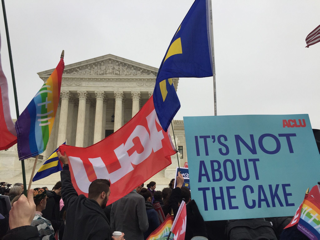UCC leaders call on U.S. Supreme Court to protect the rights of all people in Cakeshop case
 The United Church of Christ is closely following a case coming before the United States Supreme Court on Tuesday. The nation’s highest court is hearing oral arguments Dec. 5 in Masterpiece Cakeshop v. Colorado Civil Rights Commission, which involves a Colorado baker who asserts that his religious beliefs about marriage give him the right to refuse service to certain individuals.
The United Church of Christ is closely following a case coming before the United States Supreme Court on Tuesday. The nation’s highest court is hearing oral arguments Dec. 5 in Masterpiece Cakeshop v. Colorado Civil Rights Commission, which involves a Colorado baker who asserts that his religious beliefs about marriage give him the right to refuse service to certain individuals.
National leaders of the denomination have released a statement urging the Court to rule that respect for religious liberty requires recognizing diverse religious beliefs, meaning businesses open to the public must serve all people.
Here is the text of that statement:
July of 2012 was an exciting time for David Mullins and Charlie Craig when they went with Charlie’s mother to Masterpiece Cakeshop to order a cake for their upcoming wedding reception. The couple planned to marry in Massachusetts and celebrate with family and friends at home in Colorado. But their excitement changed to dismay when bakery owner Jack Phillips informed them that the bakery wouldn’t sell wedding cakes to same-sex couples.
It was discrimination under Colorado law, pure and simple, but Jack Phillips claimed his sincerely held religious views gave him that right. The General Synod of the United Church of Christ, which has had a long history of supporting the religious liberty of people of all faiths, believes that while Phillips has a right to his beliefs, the First Amendment doesn’t give him the right to ignore public accommodations laws that apply to the public marketplace.
Equal access to the public marketplace for all people, regardless of their religious identity or other characteristics, is what is at stake in the oral arguments and pending decision now before the U.S. Supreme Court in the case of Masterpiece Cakeshop v. Colorado Civil Rights Commission. The General Synod of the United Church of Christ filed an amicus brief respecting the sincerely held beliefs of the baker, but clearly stating the harm that would be done to religious liberty if the court sided with the baker. The brief was joined by the Baptist Joint Committee on Religious Liberty, the Episcopal Church, the Evangelical Lutheran Church in America, and the Chicago Theological Seminary—faith communities who hold differing views regarding the religious implications of same-sex marriage, but who all agree that human dignity as well as religious liberty must be protected.
“Respecting petitioners’ interest in their sincerely-held religious views regarding marriage does not require granting them the right to deny service in the commercial marketplace to couples in connection with the civil, or non-religious aspects of their marriages,” the brief states.
The Colorado law at issue in this case already exempts houses of worship, and other places principally used for religious purposes, as places of public accommodation, but that is not the issue in this case. No one is being asked to participate in any religious ceremony. The same sex couple simply wished to buy a cake to celebrate their wedding. There is no indication in the record that the cake would be served in a religious setting.
Masterpiece Cakeshop is looking for a religious exemption from this public accommodations law, to impose their religious beliefs on the public marketplace. Should the court grant their petition, it would open the door to discrimination and harm, depriving individuals of fair and equal access to goods and services because the shop owner disagrees with a customer’s religious perspective or practices. It would create a culture that demeans human dignity. America is a pluralistic society in which the commercial marketplace must accommodate the divergent backgrounds and beliefs of all individuals. The Supreme Court has affirmed this value on many occasions, protecting the human dignity of all citizens, and should do so here. People in America should be free to go in to any shop open to the public to purchase goods and services without discrimination.
While Masterpiece Cakeshop claims it is entitled to this exemption because of religious liberty, nothing could be further from Jesus’ command to love your neighbor as yourself. And, the practical effect of its argument is highly detrimental to religious liberty. As stated in the amicus brief: “Religious liberty itself would suffer, as religious individuals would be subject to being denied service because the commercial proprietor’s religious views differed from theirs.”
The General Synod of the United Church of Christ, siding with the couple and the Colorado Civil Rights Commission believes, “Colorado’s public accommodations law [in this case] strikes the right balance between respect for religious liberty and the protection of individuals’ right to participate in the commercial marketplace free from discrimination.”
As the UCC brief states, “Requiring commercial businesses to provide service to all qualified customers does not unduly intrude upon the liberty to practice one’s religion. Rather, it ensures that minorities (including religious minorities) are able to participate in the commercial marketplace with dignity.”
The National Officers of the United Church of Christ
The Rev. John C. Dorhauer
General Minister and President
The Rev. Traci Blackmon
Executive Minister, Justice and Witness Ministries
The Rev. James Moos
Executive Minister, Wider Church Ministries
Related News
A Prophetic Call for Justice and Peace in Palestine
The executive leaders of the United Church of Christ have issued the following statement...
Read More‘Love is Greater Than Fear’: Regional Youth Events get to the heart of gospel message
United Church of Christ teens attending this summer’s Regional Youth Events (RYE) are...
Read MoreUCC desk calendars available to order now
Prepare for your day, month and year with the United Church of Christ desk calendar —...
Read More


